Pete Sutton's Blog, page 41
September 25, 2014
North by Southwest
A forthcoming anthology by
North Bristol Writers

It's been a long trail already and we still have a ways to go. At the beginning of this year the writing group @NBCWG decided to bring out an anthology to showcase the writing of the various group members.
We now have all the stories in and our title - "North by Southwest"
We have art from the rather brilliant Claire M Hutt
& have lined up a typesetter, designer, printer etc
Now we just need the funding and have decided that we'll be doing a crowdfunding campaign which we'll be launching in the coming months.
NBCWG is a small friendly group that meets once or twice a month (currently in the Inn on the Green) to discuss writing & share creativity. The group's aims are to provide a fun and safe environment for writers at all levels of skill and experience to come together to be creative.
The anthology showcases the work of 10 writers and our artist. With stories by Jemma Milburn (founder of NBCWG), Kevlin Henney, Ian Millstead, Clare Dornan, Margaret Carruthers, Roz Clarke, Desiree Fischer, John Hawkes-Reed, Justin Newland & Yours truly.
More news soon!

It's been a long trail already and we still have a ways to go. At the beginning of this year the writing group @NBCWG decided to bring out an anthology to showcase the writing of the various group members.
We now have all the stories in and our title - "North by Southwest"
We have art from the rather brilliant Claire M Hutt
& have lined up a typesetter, designer, printer etc
Now we just need the funding and have decided that we'll be doing a crowdfunding campaign which we'll be launching in the coming months.
NBCWG is a small friendly group that meets once or twice a month (currently in the Inn on the Green) to discuss writing & share creativity. The group's aims are to provide a fun and safe environment for writers at all levels of skill and experience to come together to be creative.
The anthology showcases the work of 10 writers and our artist. With stories by Jemma Milburn (founder of NBCWG), Kevlin Henney, Ian Millstead, Clare Dornan, Margaret Carruthers, Roz Clarke, Desiree Fischer, John Hawkes-Reed, Justin Newland & Yours truly.
More news soon!
Published on September 25, 2014 02:38
September 21, 2014
Guest post - Nicholas Alan Tillemans
A Writer’s Account: Becoming an Extreme Horror Comedy Author in Today's Rough and Tumble Indie Publishing World
By Nicholas Alan Tillemans
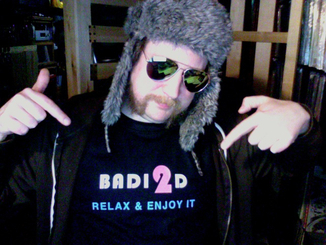
The indie publishing market of today offers exciting opportunities to a breed of authors whose works would have never been published by traditional publishers. This is good news for many writers. But don’t rush out and write your thousand-page fantasy trilogy just yet. Doing it right takes a lot of work, tenacity and patience. If you’re a self-starter and enjoy hard work, you’ll find that great things are feasible today for writers and readers alike that were not options in the past.
Naturally, not every book will sell enough copies to be a good fit for traditional publishers who have stables of artists, editors and marketers to feed. Hats off to traditional publishers for producing large print runs of quality books with mass market appeal. Today, just like in the past, traditional publishers loom large. Add a robust indie market; and customers have more choices than ever before to fit their unique tastes. Readers are just as unique as the writers who write for their enjoyment.
It’s not all sunshine, lollipops and rainbows. Many disgruntled readers complain about the new model. Some complain about poorly edited books with weak storylines and forgettable characters. While this may be a fair criticism of many titles, it does not characterize all independently published books. Some writers take a great deal of care to cover all the bases. Despite this care and concern, many indie authors find the costs of professional editorial services prohibitive. So, many self-edit their works; and some are less successful than others.
There is no gatekeeper anymore. So, almost anything can make it through; and, therefore, making it to market is not the accomplishment it once was. It does not directly equate to any sales whatsoever. Not everything that makes it through sells even a single copy or lands reviews to help it sell. So, in the indie model, the cream will probably eventually rise to the top. But it is incumbent upon the indie author to spread the word and to demonstrate the merits of his or her books.
This is easier said than done.
One can post about one’s books on social media, facebooking and tweeting about them ad nauseum to the initial delight and inevitable aggravation of one’s friends and acquaintances. There is a risk that people will simply stop paying attention. People will only buy a book once and will only be annoyed by constant reminders that it is available for sale. This means authors need to find a wide range of venues to showcase their books.
Seeking reviews from bloggers and review sites is a good idea and one way to make a case for a book’s merits. I’ve landed several such reviews for each of my books; but an indie author can’t expect a landslide of reviews. Many of those who would be interested in any given genre are currently overwhelmed and not accepting new requests. Giveaways are helpful. So far, I’ve landed two reviews and one five-star rating from the fifteen books I gave away through Goodreads.
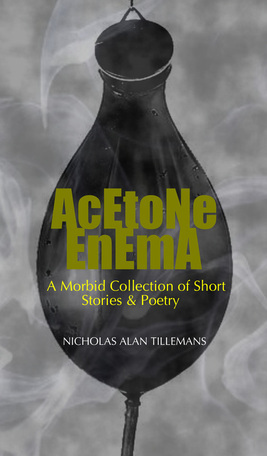
Of course, nothing is a given. Even if an author lands dozens of glowing reviews, those reviews won’t necessarily convert to sales. People have more choices today than ever before. There is stiff competition for the customer’s entertainment dollar; and the competition is hungrier than ever before. We’ve traded a gatekeeper for a hungry mob of writers. But it’s not a faceless mob. We all come from somewhere; and it’s not all about making money.
Myself, I write compulsively and have 'indie writer' written all over me. I have been writing horror fiction since I was a young child and hardly able to write at all. My earliest book was entitled “The Martians of Skull Island.” It was a terrible book with an unsatisfying storyline. If not for the crude but whimsical artwork, it would have been a total miss. As I entered fourth grade, I started writing a book entitled “The Mysterious Man Wearing Sunglasses,” which was completely derivative fan fiction. I even made the laughable gaffe of writing myself in as a die-hard action hero. By fifth grade, I was writing very short horror stories and poetry. This reflected my fascination with the horror genre. I was a fan of Edgar Allen Poe and remember reading Stephen King’s Night Shift and Cujo in sixth grade.
Through high school and college, I had a preoccupation with morbid things and continued to write longer and longer books: Societal Junkie, Hard Ball and Ugly Stick. I majored in philosophy and psychology in college, finding these topics both fascinating and terrifying. My writing became more extreme as I continued testing the limits of reality and good taste.
Immediately after college, I started writing a romance novel with a headless female protagonist, “Acetone Enema.” I eventually gave up on it as a novel and turned it into a short story by the same name, which I submitted to an exposure market, The House of Pain. For the next several years, I wrote a dozen short stories in a similar vein—e.g. “Baby Hunter,” “The Mechanics of Perversion,” “The Purloined Lips of Destiny,” etc. Encouraged by the positive feedback I was receiving, I began writing The Torture of Girth, my first novel.
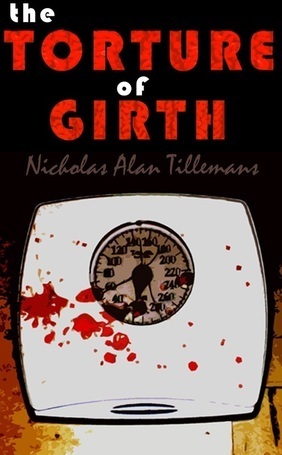
I submitted various short stories to paying markets over the next several years with no takers. Ten years passed. During that time, I married my wife, we bought an old house, and my son was born. I noticed that the publishing landscape was changing dramatically. I tested the waters by independently publishing a collection of short stories and poetry: Acetone Enema: A Morbid Collection of Short Stories & Poetry. I landed positive reviews; and there seemed to be renewed interest in my writing. So, I hazarded a final rewrite of my novel The Torture of Girth; and I have now independently published the novel as well.
Unlike traditional publishers, I have never asked whether I would make money from my books, but rather only whether there was some public interest in them. I can’t help writing what I write. Life events and other creative endeavors have drawn me away from writing for years at a time. But I always come back to it. It’s an integral part of who I am. As such, I find myself inexorably diving into the indie mosh pit. For all of its problems, it looks like it’s here to stay. We should all be sure to stay on our feet and watch for hurdling bodies.
--------
Many thanks to Nicholas for dropping by and talking about his writing!
By Nicholas Alan Tillemans

The indie publishing market of today offers exciting opportunities to a breed of authors whose works would have never been published by traditional publishers. This is good news for many writers. But don’t rush out and write your thousand-page fantasy trilogy just yet. Doing it right takes a lot of work, tenacity and patience. If you’re a self-starter and enjoy hard work, you’ll find that great things are feasible today for writers and readers alike that were not options in the past.
Naturally, not every book will sell enough copies to be a good fit for traditional publishers who have stables of artists, editors and marketers to feed. Hats off to traditional publishers for producing large print runs of quality books with mass market appeal. Today, just like in the past, traditional publishers loom large. Add a robust indie market; and customers have more choices than ever before to fit their unique tastes. Readers are just as unique as the writers who write for their enjoyment.
It’s not all sunshine, lollipops and rainbows. Many disgruntled readers complain about the new model. Some complain about poorly edited books with weak storylines and forgettable characters. While this may be a fair criticism of many titles, it does not characterize all independently published books. Some writers take a great deal of care to cover all the bases. Despite this care and concern, many indie authors find the costs of professional editorial services prohibitive. So, many self-edit their works; and some are less successful than others.
There is no gatekeeper anymore. So, almost anything can make it through; and, therefore, making it to market is not the accomplishment it once was. It does not directly equate to any sales whatsoever. Not everything that makes it through sells even a single copy or lands reviews to help it sell. So, in the indie model, the cream will probably eventually rise to the top. But it is incumbent upon the indie author to spread the word and to demonstrate the merits of his or her books.
This is easier said than done.
One can post about one’s books on social media, facebooking and tweeting about them ad nauseum to the initial delight and inevitable aggravation of one’s friends and acquaintances. There is a risk that people will simply stop paying attention. People will only buy a book once and will only be annoyed by constant reminders that it is available for sale. This means authors need to find a wide range of venues to showcase their books.
Seeking reviews from bloggers and review sites is a good idea and one way to make a case for a book’s merits. I’ve landed several such reviews for each of my books; but an indie author can’t expect a landslide of reviews. Many of those who would be interested in any given genre are currently overwhelmed and not accepting new requests. Giveaways are helpful. So far, I’ve landed two reviews and one five-star rating from the fifteen books I gave away through Goodreads.

Of course, nothing is a given. Even if an author lands dozens of glowing reviews, those reviews won’t necessarily convert to sales. People have more choices today than ever before. There is stiff competition for the customer’s entertainment dollar; and the competition is hungrier than ever before. We’ve traded a gatekeeper for a hungry mob of writers. But it’s not a faceless mob. We all come from somewhere; and it’s not all about making money.
Myself, I write compulsively and have 'indie writer' written all over me. I have been writing horror fiction since I was a young child and hardly able to write at all. My earliest book was entitled “The Martians of Skull Island.” It was a terrible book with an unsatisfying storyline. If not for the crude but whimsical artwork, it would have been a total miss. As I entered fourth grade, I started writing a book entitled “The Mysterious Man Wearing Sunglasses,” which was completely derivative fan fiction. I even made the laughable gaffe of writing myself in as a die-hard action hero. By fifth grade, I was writing very short horror stories and poetry. This reflected my fascination with the horror genre. I was a fan of Edgar Allen Poe and remember reading Stephen King’s Night Shift and Cujo in sixth grade.
Through high school and college, I had a preoccupation with morbid things and continued to write longer and longer books: Societal Junkie, Hard Ball and Ugly Stick. I majored in philosophy and psychology in college, finding these topics both fascinating and terrifying. My writing became more extreme as I continued testing the limits of reality and good taste.
Immediately after college, I started writing a romance novel with a headless female protagonist, “Acetone Enema.” I eventually gave up on it as a novel and turned it into a short story by the same name, which I submitted to an exposure market, The House of Pain. For the next several years, I wrote a dozen short stories in a similar vein—e.g. “Baby Hunter,” “The Mechanics of Perversion,” “The Purloined Lips of Destiny,” etc. Encouraged by the positive feedback I was receiving, I began writing The Torture of Girth, my first novel.

I submitted various short stories to paying markets over the next several years with no takers. Ten years passed. During that time, I married my wife, we bought an old house, and my son was born. I noticed that the publishing landscape was changing dramatically. I tested the waters by independently publishing a collection of short stories and poetry: Acetone Enema: A Morbid Collection of Short Stories & Poetry. I landed positive reviews; and there seemed to be renewed interest in my writing. So, I hazarded a final rewrite of my novel The Torture of Girth; and I have now independently published the novel as well.
Unlike traditional publishers, I have never asked whether I would make money from my books, but rather only whether there was some public interest in them. I can’t help writing what I write. Life events and other creative endeavors have drawn me away from writing for years at a time. But I always come back to it. It’s an integral part of who I am. As such, I find myself inexorably diving into the indie mosh pit. For all of its problems, it looks like it’s here to stay. We should all be sure to stay on our feet and watch for hurdling bodies.
--------
Many thanks to Nicholas for dropping by and talking about his writing!
Published on September 21, 2014 10:22
September 20, 2014
Review of The Moon King & interview with the author, Neil Williamson
Neil Williamson lives in Glasgow, Scotland. His short stories can be found in The Ephemera (Infinity Plus Books), with Andrew J Wilson he edited Nova Scotia: New Scottish Speculative Fiction (Mercat Press), and his work has been nominated for British Fantasy, British Science Fiction and World Fantasy awards.
Neil is a longstanding member of the notorious school of literary pugilism known as the Glasgow SF Writers Circle, and he has the internal bruising to prove it.

*****website: www.neilwilliamson.org.uktwitter: @neiljwilliamson
Neil kindly agreed to answer questions about the book. The Bristol Book Blog review is after the interview.
The Moon King is a fantasy novel about a city which has become synchronised with the phases of the moon's wax and wane. The story tells what happens when the machine that keeps the satellite in orbit around the city starts to fail, and features an engineer, an artist and an ex-policeman who become embroiled in the ensuing turmoil as nature starts to re-establish control, while the apparently immortal ruler of the city stops at nothing to prevent that from happening.
That's genuinely a question I've never considered before. I admire aspects of almost all the characters, but the major protagonists are all deeply flawed people. The ones I've personally got most affinity with are the secondary characters: Mia, the night biographer; Shirley, the cafe owner; and the astronomer, Alice Muir... but, you know, none of them have a pleasant time of it, so I'm not sure I'd volunteer to "be" any of them.
The writing I think. The book went through so many drafts, so many nips tucks and polishes that there are some passages of writing in there that I think came out especially nicely. Everything else I'm varying degrees of happy with, but looking forward to improving with the next book. I'm pleased that people mostly seem to be enjoying it. At the end of the day that's all you can ask as a writer.
"A Piece Of The Moon", which was written to be a bonus story in the hardback edition and also included in Newcon's Moonshots series of standalone short stories, was constructed from a cut scene from the novel. The story takes place around the time of the events of the first third of the main novel and offers an additional perspective on the luck monkeys, that feature, but aren't fully explained, in the book.
I never say never with anything when it comes to story ideas, but there are no plans to write any more in the world and time frame of The Moon King.
Memory forms both a fundamental part of our understanding of who we are and our personal record of the events of our lives. And we take it for granted. I liked the idea if examining the limits of that. To say anything more about how I do that in the story would, I suspect, risk spoilers, but I found it an interesting, and tricky, thing to try and pull off.
In terms of the mechanics of writing, like most writers I think, I outline a bit and I free-wheel a bit. How much of each depends on the circumstance at the time. You've got to be flexible.
The long form is still pretty new to me, so I'm enjoying the process of learning how to do novel-length plotting, character development, and so on, at the moment. Short stories came first, and I think they naturally suit my idea-span which tends to be tightly focused and detail-oriented. My stories often feature tiny effects that don't involve much action or event, and that's harder to get away with at a longer length. With the novels I'm having to unpack and extrapolate, to plan dramatic arcs, all that: with short stories you can just get down there and sketch out your idea in a couple of scenes, a few pages. And short stories are also useful for exploring daft or out-there ideas, or for just doing something beautiful or poetic that wouldn't require or merit expansion to a longer length.
Finish everything you begin: only then can you properly set about improving it.
Many thanks to Neil for the interesting answers!
Bristol Book Blog Review:
Those of an idle frame of mind could find a place in Glassholm to sit the day long and watch the moon
Let me start with the beautiful cover
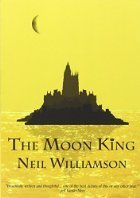
Yes, you're not supposed to judge a book by its cover, but it is the reason I picked this up, in an Edinburgh SF bookshop. Which is appropriate since Neil is Scottish I guess. The premise so intrigued me once I'd picked it up that I had to buy it.
Life under the moon has always been so predictable, day follows night, wax phases to wane and, after the despair of every Darkday, a person's mood soars to euphoria at Full.
A former policeman investigates a series of puzzling murders, an artist is drawn into the politics of revolution and an engineer, jilted on his wedding day, has to fix the machine at the heart of the city. Meanwhile the creatures of the immortal ruler, the Lunane, are acting out of character. There is a cell full of crabs in the police station, the crows are gathering at the Castil and the luck monkeys touch the lives of our protagonists.
The monkey blinked and then reached into its mouth and removed a metal disc that appeared too wide to have possibly fitted in there...
This is a phantasmagoric book that slowly unfolds drawing you ever further into its fantastical world. As more layers are revealed it becomes ever more strange and ever more compelling. Williamson has built a stand out world here, one that is a real pleasure to visit, even as things veer towards madness. For the moon is a prime character in the book, of course. As are cycles, memory, order and duty.
"I spent Dark with friends." It was the first thing that came into his head but he'd had to lie hadn't he. He couldn't tell her that he could not remember a coherent thing after being at the bandstand the previous afternoon.
There is an ebb and flow from chapter to chapter and sometimes scene to scene between the three main characters and later on the book grips you and keeps you turning the pages.
It's a bit of a slow-burner and the language can sometimes be flowery, but only very occasionally, and these are not even minor niggles, more a matter of taste and mood.
While the moon grows fat, we are happyWhile the moon grows thin, we cry
(start of a popular song in Glassholm)
Overall - This is a very accomplished debut that deserves a wide readership. This is very much my sort of thing. Highly recommended.
Neil is a longstanding member of the notorious school of literary pugilism known as the Glasgow SF Writers Circle, and he has the internal bruising to prove it.

*****website: www.neilwilliamson.org.uktwitter: @neiljwilliamson
Neil kindly agreed to answer questions about the book. The Bristol Book Blog review is after the interview.
For anyone who has not yet read The Moon King can you tell us a bit about it?
The Moon King is a fantasy novel about a city which has become synchronised with the phases of the moon's wax and wane. The story tells what happens when the machine that keeps the satellite in orbit around the city starts to fail, and features an engineer, an artist and an ex-policeman who become embroiled in the ensuing turmoil as nature starts to re-establish control, while the apparently immortal ruler of the city stops at nothing to prevent that from happening.
Tell us a little about the path to publicationBeing my first attempt at a novel, I'm pleasantly surprised that it's published at all! The book was originally written several years ago but my agent was unable to interest the major UK publishers. It looked like we'd exhausted the likely options but then Ian Whates of Newcon Press enquired about it. Ian quickly declared an interest in publishing the novel, but on condition of some fairly extensive revisions - which included rewriting one of the characters and cutting the length of the book by a sixth. None of which I regret, because the work improved the book hugely. It took a while to get there - overall, from first word to publication day was close to nine years - and for me it really demonstrates the key role played by independent presses in today's market.
If you could be a character from the book who would it be and why?
That's genuinely a question I've never considered before. I admire aspects of almost all the characters, but the major protagonists are all deeply flawed people. The ones I've personally got most affinity with are the secondary characters: Mia, the night biographer; Shirley, the cafe owner; and the astronomer, Alice Muir... but, you know, none of them have a pleasant time of it, so I'm not sure I'd volunteer to "be" any of them.
What are you most proud of about the book?
The writing I think. The book went through so many drafts, so many nips tucks and polishes that there are some passages of writing in there that I think came out especially nicely. Everything else I'm varying degrees of happy with, but looking forward to improving with the next book. I'm pleased that people mostly seem to be enjoying it. At the end of the day that's all you can ask as a writer.
Have you set any other stories in the world of the book? Are you planning to do more?
"A Piece Of The Moon", which was written to be a bonus story in the hardback edition and also included in Newcon's Moonshots series of standalone short stories, was constructed from a cut scene from the novel. The story takes place around the time of the events of the first third of the main novel and offers an additional perspective on the luck monkeys, that feature, but aren't fully explained, in the book.
I never say never with anything when it comes to story ideas, but there are no plans to write any more in the world and time frame of The Moon King.
Memory is a prime theme in the book - what interests you, as a writer, about the subject?
Memory forms both a fundamental part of our understanding of who we are and our personal record of the events of our lives. And we take it for granted. I liked the idea if examining the limits of that. To say anything more about how I do that in the story would, I suspect, risk spoilers, but I found it an interesting, and tricky, thing to try and pull off.
Do you have a set writing process? If so what is it?Not a process, but a routine. I've got a busy day job, as well as a cabaret act, a band and a home life, so I need to fit my writing into the corners of the day. On week days this means an hour before work and an hour at lunch. At the weekends I usually manage somewhere between 2-4 hours cafe time on both Saturday and Sunday. Doing something every day is the only way for me to ensure any kind of progress. I don't have time to waste on picking up the thread of where I was a week ago.
In terms of the mechanics of writing, like most writers I think, I outline a bit and I free-wheel a bit. How much of each depends on the circumstance at the time. You've got to be flexible.
Talking about your short stories for a bit, what do you most enjoy about short stories? Do you prefer the short or long form?
The long form is still pretty new to me, so I'm enjoying the process of learning how to do novel-length plotting, character development, and so on, at the moment. Short stories came first, and I think they naturally suit my idea-span which tends to be tightly focused and detail-oriented. My stories often feature tiny effects that don't involve much action or event, and that's harder to get away with at a longer length. With the novels I'm having to unpack and extrapolate, to plan dramatic arcs, all that: with short stories you can just get down there and sketch out your idea in a couple of scenes, a few pages. And short stories are also useful for exploring daft or out-there ideas, or for just doing something beautiful or poetic that wouldn't require or merit expansion to a longer length.
What are you working on right now? (apart from this interview of course!)I'm working on a novel called Queen Of Clouds. It's sort of a distant prequel to The Moon King and tells the story of how the more fantastical aspects of nature, as described in the first novel, came to be. It's set in a post-upload humanocentric meritocracy and features wooden people, sentient weather and mind-controlling ink.
And finally in one sentence what is your best piece of advice for new writers?
Finish everything you begin: only then can you properly set about improving it.
Many thanks to Neil for the interesting answers!
Bristol Book Blog Review:
Those of an idle frame of mind could find a place in Glassholm to sit the day long and watch the moon
Let me start with the beautiful cover

Yes, you're not supposed to judge a book by its cover, but it is the reason I picked this up, in an Edinburgh SF bookshop. Which is appropriate since Neil is Scottish I guess. The premise so intrigued me once I'd picked it up that I had to buy it.
Life under the moon has always been so predictable, day follows night, wax phases to wane and, after the despair of every Darkday, a person's mood soars to euphoria at Full.
A former policeman investigates a series of puzzling murders, an artist is drawn into the politics of revolution and an engineer, jilted on his wedding day, has to fix the machine at the heart of the city. Meanwhile the creatures of the immortal ruler, the Lunane, are acting out of character. There is a cell full of crabs in the police station, the crows are gathering at the Castil and the luck monkeys touch the lives of our protagonists.
The monkey blinked and then reached into its mouth and removed a metal disc that appeared too wide to have possibly fitted in there...
This is a phantasmagoric book that slowly unfolds drawing you ever further into its fantastical world. As more layers are revealed it becomes ever more strange and ever more compelling. Williamson has built a stand out world here, one that is a real pleasure to visit, even as things veer towards madness. For the moon is a prime character in the book, of course. As are cycles, memory, order and duty.
"I spent Dark with friends." It was the first thing that came into his head but he'd had to lie hadn't he. He couldn't tell her that he could not remember a coherent thing after being at the bandstand the previous afternoon.
There is an ebb and flow from chapter to chapter and sometimes scene to scene between the three main characters and later on the book grips you and keeps you turning the pages.
It's a bit of a slow-burner and the language can sometimes be flowery, but only very occasionally, and these are not even minor niggles, more a matter of taste and mood.
While the moon grows fat, we are happyWhile the moon grows thin, we cry
(start of a popular song in Glassholm)
Overall - This is a very accomplished debut that deserves a wide readership. This is very much my sort of thing. Highly recommended.
Published on September 20, 2014 03:37
September 17, 2014
Review -Mind Seed
Mind Seed Edited by David Gullen and Gary Couzens
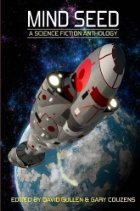
The T Party is a London based writers group that have put together this SF anthology in memory of one their members, Denni Schnapp, who took her own life in 2013. Proceeds from the book go to Next Generation Nepal, an anti-child trafficking charity supported by Denni. The introduction tells us that Denni wrote about How would technological developments affect us as humans, both individually and socially … Her stories were of travel and journey, interaction and transformation, of strong characters and their weaknesses. and the stories are from those that knew Denni and her storiesThey cover the themes that Denni tackled in her own work: exploration, interaction, the nature of intelligence, and communication with the unknown.There are nine solid tales in the book, including the title story Mind Seed an interesting speculation on rejuvenation and being on and off the grid.
The collection starts with Sex and the single hive mind by Helen Callaghan which is the best SF short story I’ve read for a long while, one that got my synapses buzzing from its inventiveness, tone and prose, highly recommended and a writer I’m looking forward to reading more from. It’s a story about all the themes promised in the intro, about a drug called Seething Green and of a cop on the drug squad. Other stand out stories are by Ian Whates with a creepy little tale of alien contact in Darkchild and Rockhopper by Martin Owton & Gary Couzens about a miner who discovers a derelict, which does that difficult thing in a short story of building an entire, plausible universe within the confines of the story. Nina Allen’s BSFA shortlisted Bird songs at eventide on top of her story in the previously reviewed Solaris Rising 3 also places her in my “writers to watch” category.
But suffice to say there are no duff stories in the collection although of course I liked some more than others.
Overall – A fine collection of SF shorts. Recommended.

The T Party is a London based writers group that have put together this SF anthology in memory of one their members, Denni Schnapp, who took her own life in 2013. Proceeds from the book go to Next Generation Nepal, an anti-child trafficking charity supported by Denni. The introduction tells us that Denni wrote about How would technological developments affect us as humans, both individually and socially … Her stories were of travel and journey, interaction and transformation, of strong characters and their weaknesses. and the stories are from those that knew Denni and her storiesThey cover the themes that Denni tackled in her own work: exploration, interaction, the nature of intelligence, and communication with the unknown.There are nine solid tales in the book, including the title story Mind Seed an interesting speculation on rejuvenation and being on and off the grid.
The collection starts with Sex and the single hive mind by Helen Callaghan which is the best SF short story I’ve read for a long while, one that got my synapses buzzing from its inventiveness, tone and prose, highly recommended and a writer I’m looking forward to reading more from. It’s a story about all the themes promised in the intro, about a drug called Seething Green and of a cop on the drug squad. Other stand out stories are by Ian Whates with a creepy little tale of alien contact in Darkchild and Rockhopper by Martin Owton & Gary Couzens about a miner who discovers a derelict, which does that difficult thing in a short story of building an entire, plausible universe within the confines of the story. Nina Allen’s BSFA shortlisted Bird songs at eventide on top of her story in the previously reviewed Solaris Rising 3 also places her in my “writers to watch” category.
But suffice to say there are no duff stories in the collection although of course I liked some more than others.
Overall – A fine collection of SF shorts. Recommended.
Published on September 17, 2014 05:57
Interview with Adrian Tchaikovsky
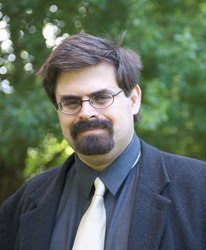
Adrian Tchaihovsky is the author of the Shadows of the Apt, an amazing 10 book series. He was born in Lincolnshire and studied zoology and psychology at Reading, before practising law in Leeds. He is a keen live role-player and occasional amateur actor and is trained in stage-fighting. His literary influences include Gene Wolfe, Mervyn Peake, China Miéville, Mary Gentle, Steven Erikson, Naomi Novak, Scott Lynch and Alan Campbell..
A full bibliography can be found here
Adrian can be found on Facebook, Goodreads and on Twitter as @aptshadow
For anyone that hasn’t read them can you tell us a bit about your books?
That’s suddenly become a more complicated question that it used to. I’m currently known for the Shadows of the Apt series – ten books from Empire in Black and Gold to Seal of the Worm that deal with a world of insect-inspired humans facing a war that brings not just devastation but fast-paced technological and social change. It’s an epic fantasy, but I hope it also brings a lot of new ideas to the table – both in the insect-kinden themselves and in the way the book and the world develop over the course of the series – changing from a classical/medieval sort of setting into something closer to an alternate world 20th century. That series is complete now, though, and next year I’ve got two new books coming out, my first long-form fiction that doesn’t follow the exploits of the kinden – one fantasy and one science fiction.
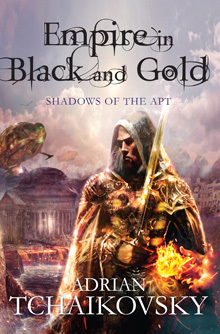
Tell us a bit more “Last book” is also a rather fluid phrase. I hit the ground running with 5 books finished by the time Empirewas published, and I’ve managed to stay ahead of the game ever since. The nextbook out, though – which means more, both to me and, hopefully, to readers – is Guns of the Dawn, which I’ve called “Jane Austen meets Bernard Cornwell (by way of Ursula le Guin)”. It’s set in a secondary world, but one that bears more than a passing resemblance to 1800s England. Emily Marshwic is a practical-minded young gentlewoman in the Eliza Bennett mould, there is a war on, and she ends up in the army not because she’s following a sweetheart or pretending to be a man, but because the war is going sufficiently badly that there’s a draft of women. Suffice to say, things go downhill for her from there.
What did you learn about writing whilst writing the last book you wrote?
With Guns, one of the main differences is that Emily is the only point of view character, contrasted with Shadows of the Apt where the narrative skips between a reasonable number of them. One reason is that Guns is a more personal story, and smaller in scale – not the empire-spanning epic, but more about personal heroism and tragedy. Looking at next year’s other new release, Children of Time (formerly Portia’s Children – and disputes over titles with one’s publisher is probably worth an interview in and of itself), this is a SF book, spaceships and alien planets and the lot, and the thing I learned about writing with this one is “research is hard.” I am conscientious about the science – which doesn’t mean that there isn’t some magicianly hand-waving going on at the key concept level, but because of that I did my level best to make everything else at least borderline plausible.
Do you have a set writing process, if so what is it?
I think the big thing is that I plan ahead a lot. I tend to have a chapter by chapter plan, and whilst this often changes and shifts about (especially the 2nd act) during the writing process, I usually have a clear idea of what’s next. In turn, this tends to keep the wordcount up, as I generally know what’s immediately next whenever I sit down to write.
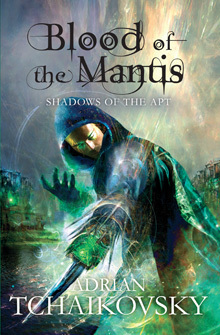
Do you write a lot of short stories?
Not as many as I’d like. These days I tend to write when I have a commission, or for submission for a particular anthology or opportunity. I’d like to be able to just write short stories for the hell of it, and try to place them afterwards, but time constraints make that a tough sell.
Do you prefer the long or short form? How do you feel about Flash Fiction?
Long form fiction is my first home, really. I like being able to spend time creating the world and the characters. Short form is a very different art – some way along the scale that runs from epics down to poetry, where the further you go, the more every word weighs, and the more economy of expression (always a virtue, but so much more of a necessity as you get shorter) becomes paramount. With very short fiction – 1000 words, say – everything counts. This leads to a lot of neat, clean single-issue stories, and if an idea can be said in 1000 words that’s a good argument that you shouldn’t use 2000 on it. However, there is a limit to what ideas can be condensed like that, and to how well you can explore such ideas – short stories are very good at setting up questions, not so much for considering answers.
Which character in your books do you most identify with and why?
I want to say Tisamon. Tisamon’s lean and deadly and fast, and he’s vastly skilled with a blade, and he’s tragic. He’s the proper hero that a fantasy story cries out for. But I’m not Tisamon. I’m not even Thalric, the sneaky, hard-edged bastard, though I do enjoy writing for him. Stenwold and Che are the heart of the book: the two clumsy, doubting Beetle-kinden from the kinden’s nascent and rather ropey democracy. They bumble through the books doing their level best, and getting beaten into shape by a variety of unpleasant events and reversals. Che goes from the fifth-wheel awkward teenager to a woman whose shoulders are broad enough to hold the fates of thousands – and she does it herself, no prophecies or magic swords. Sten is the idealistic demagogue who lives long enough to find himself on the brink of becoming a monster through spending so long fighting them: a middle-aged, middle-class hero, heir to all the familiar human failings.
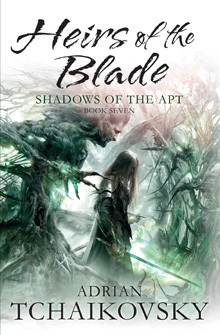
Which bit of your writing are you most proud of?
There are a couple of moments in War Master’s Gate that still get me. It’s hard to say much about them because of spoilers, but the fight at the gates of Collegium is one, and the later exploits of Eujen, Averic and Straessa in the city. Hopefully people who have read that far know what I mean.
Tell us a bit about how you got published? Did you go via a slush pile? Get an agent before a publisher?
I was fifteen years in the wilderness of the slush pile before I got anywhere. However, while that sounds bad, I will freely state that my early work was, well, Not Very Good. If I had been in a position to shove that stuff out there as it was (and at the time I was entirely convinced of its wonderful quality) then the results would have been less than readable. Over those 15 years I wrote a lot of books, each one hopefully better than the last. With Shadows, I wrote the first plot arc (books 1-4) and caught the attention of an agent with Empire. This was at a time when the major publishers had pretty full lists, but the fact that I had books ready to roll, that could be released swiftly and without fear of an attack of writer’s block, enabled my agent to crowbar me into Tor UK’s good graces.
In one sentence what is your best piece of advice for new writers?
This is a hard question to answer, these days. Never underestimate the value of a good editor, whether provided by a publishing house or a freelancer you’ve engaged yourself. Another pair of eyes, another discerning point of view from someone who has a licence to give you something other than unqualified praise, is always going to be useful, no matter how good you are. God knows I need it.
Many thanks to Adrian for popping by and chatting to us!
Published on September 17, 2014 05:31
September 16, 2014
Two reviews - Torture of Girth & The Reason I Jump
Torture of girth by Nicholas Alan Tillmans
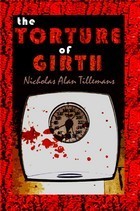
Average
In Springwood, it’s never okay to talk about the world “outside.” People wonder about it. It can’t be helped. But there’s no point to talking about it. No one who’s been there shares anything. Besides that, it’s dangerous. “Talkers”—people who are overheard talking about the world outside—are routinely monitored. If they are caught sharing too much or saying something threatening or disparaging about the powers that be, they are arrested and often imprisoned or even put to death. All it takes is a mere mention of the world “outside” to warrant an arrest.
Harry Gorman is an underachiever, working in a butcher shop, spineslessly taking a pay cut, not really connecting with his wife (who he doesn’t know is having an affair) and not being able to summon the effort to properly clean out his fish tank. However he doesn’t know that the city he lives in is on top of an underground prison containing odd, evil, spiritual creatures perhaps his must be why no-one is allowed to leave the city? This is a tale of spiritual possessions and has a fair share of horror (both psychological and physical) and mostly the plot just scoots along. There were a few errors that crept in towards the end and there are important new characters being added even in the last few chapters (and sometimes it was hard to differentiate between some of them). I’d also have liked a bit more of an explanation of the setting and maybe more work to ground the plot. It’s a pretty dark tale but does have some levity, comedy horror is difficult to pull off well but mostly Tillmans succeeds. There is talent and story here but as with many self-pub you can’t help but feel it lacks a little bit in polish, however this is head and shoulders above many out there and worth parting with a bit of cash for an entertaining ride.
Overall – If you like Scott Sigler you’ll probably like this. Enjoyable horror.
The Reason I jump by Naoki Higashida, translated by David Mitchell
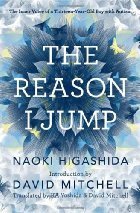
This is a short book by a 13 year old Japanese boy with Autism who answers a series of questions such as “What is the reason I jump” – it is mostly sparse and honest prose but occasionally beautiful, and includes a highly symbolic story at the end. There isn’t much to say about this one. If you’ve ever wondered about what life is like with autism, or want an autistic perspective on the joys of repetition then this book will provide answers. I mostly picked this up because it’s translated by David Mitchell and I was at an event but it I’m very glad I did.
Overall - I think this should be read by everyone really, as it is a study in empathy

Average
In Springwood, it’s never okay to talk about the world “outside.” People wonder about it. It can’t be helped. But there’s no point to talking about it. No one who’s been there shares anything. Besides that, it’s dangerous. “Talkers”—people who are overheard talking about the world outside—are routinely monitored. If they are caught sharing too much or saying something threatening or disparaging about the powers that be, they are arrested and often imprisoned or even put to death. All it takes is a mere mention of the world “outside” to warrant an arrest.
Harry Gorman is an underachiever, working in a butcher shop, spineslessly taking a pay cut, not really connecting with his wife (who he doesn’t know is having an affair) and not being able to summon the effort to properly clean out his fish tank. However he doesn’t know that the city he lives in is on top of an underground prison containing odd, evil, spiritual creatures perhaps his must be why no-one is allowed to leave the city? This is a tale of spiritual possessions and has a fair share of horror (both psychological and physical) and mostly the plot just scoots along. There were a few errors that crept in towards the end and there are important new characters being added even in the last few chapters (and sometimes it was hard to differentiate between some of them). I’d also have liked a bit more of an explanation of the setting and maybe more work to ground the plot. It’s a pretty dark tale but does have some levity, comedy horror is difficult to pull off well but mostly Tillmans succeeds. There is talent and story here but as with many self-pub you can’t help but feel it lacks a little bit in polish, however this is head and shoulders above many out there and worth parting with a bit of cash for an entertaining ride.
Overall – If you like Scott Sigler you’ll probably like this. Enjoyable horror.
The Reason I jump by Naoki Higashida, translated by David Mitchell

This is a short book by a 13 year old Japanese boy with Autism who answers a series of questions such as “What is the reason I jump” – it is mostly sparse and honest prose but occasionally beautiful, and includes a highly symbolic story at the end. There isn’t much to say about this one. If you’ve ever wondered about what life is like with autism, or want an autistic perspective on the joys of repetition then this book will provide answers. I mostly picked this up because it’s translated by David Mitchell and I was at an event but it I’m very glad I did.
Overall - I think this should be read by everyone really, as it is a study in empathy
Published on September 16, 2014 03:20
September 12, 2014
#FridayFlash
Seeds
He thought if he could find the right word seed it would all come together. Around that one word he would place two more, around those two four more until he had a sentence. Around that sentence he would place another either side, around those three another two each side until he formed a paragraph. On each side of the paragraph another and so on - scene to chapter to section to book. If only he could find the right word seed.
He thought if he could find the right word seed it would all come together. Around that one word he would place two more, around those two four more until he had a sentence. Around that sentence he would place another either side, around those three another two each side until he formed a paragraph. On each side of the paragraph another and so on - scene to chapter to section to book. If only he could find the right word seed.
Published on September 12, 2014 07:18
September 10, 2014
David Mitchell visits Bath
Last night we attended a Mr B's event in Bath at the United Reformed chirch on Argyle street, which was an interesting venue.
After being regaled by the lovely Bookshop Band

David Mitchell read from his new book - The Bone Clocks
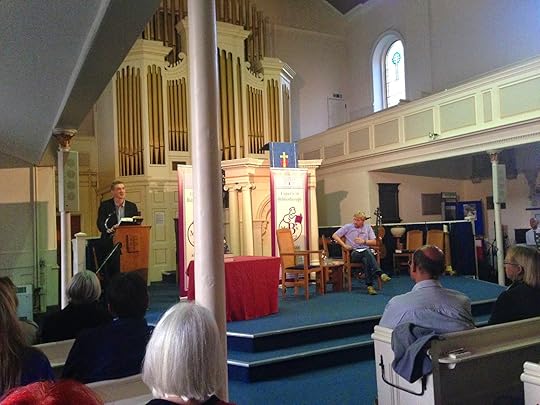
and then Mr B interviewed him and the time just flew past as the erudite Mr Mitchell was never less than fascinating
 We dashed to the front of the signing queue so we could escape early and try and catch up on the sleep we missed in York and got the book signed (having stupidly left his back catalogue at home) We did pick up a copy of the book he translated though (
The reason I jump
) and had a quick chat about it with him whilst his publicist nervously looked at the massive queue behind us.
We dashed to the front of the signing queue so we could escape early and try and catch up on the sleep we missed in York and got the book signed (having stupidly left his back catalogue at home) We did pick up a copy of the book he translated though (
The reason I jump
) and had a quick chat about it with him whilst his publicist nervously looked at the massive queue behind us.
Can't wait to start the book, although someone may have bagsied it first so I'll have to wait a couple of days...
The event was mentioned on Points West here (at around 19:56) worth a watch if you missed the Bookshop Band live ...
Another great evening in the company of Mr B's who really do put on superlative events.
After being regaled by the lovely Bookshop Band

David Mitchell read from his new book - The Bone Clocks

and then Mr B interviewed him and the time just flew past as the erudite Mr Mitchell was never less than fascinating
 We dashed to the front of the signing queue so we could escape early and try and catch up on the sleep we missed in York and got the book signed (having stupidly left his back catalogue at home) We did pick up a copy of the book he translated though (
The reason I jump
) and had a quick chat about it with him whilst his publicist nervously looked at the massive queue behind us.
We dashed to the front of the signing queue so we could escape early and try and catch up on the sleep we missed in York and got the book signed (having stupidly left his back catalogue at home) We did pick up a copy of the book he translated though (
The reason I jump
) and had a quick chat about it with him whilst his publicist nervously looked at the massive queue behind us.Can't wait to start the book, although someone may have bagsied it first so I'll have to wait a couple of days...
The event was mentioned on Points West here (at around 19:56) worth a watch if you missed the Bookshop Band live ...
Another great evening in the company of Mr B's who really do put on superlative events.
Published on September 10, 2014 03:40
So Fantasycon 2014 happened
Fantasycon 2014 has been and gone. We packed our bags and navigated across the country to York, stopping off along the way to ensure scurvy didn't set in on our epic journey.
York was lovely


and a major draw for getting us to Fantasycon if truth be told. We did a whole bunch of touristy stuff, including the obligatory museum of smells (Jorvik centre) but York is just pretty and well worth a visit. The hotel was right next to the train station (and the excellent York Tap in the station) and a pretty interesting building in its own right

The program didn't look hugely inspiring at first glance but we were glad to be pleasantly surprised at finding a bunch of enjoyable panels and other stuff to do. As a bonus York was also a bit of a foodie destination and we visited Trembling Madness (which really should be featured on @Badtaxidermy), El Piano and Krakatoa which were all brilliant
 Vegan Feast at El Piano
Vegan Feast at El Piano
We learned about rejection in the first panel we attended

in what seemed to be the hottest room in the hotel. Luckily the panellists were entertaining enough to prevent the soporific heat having too much of an effect.
We also went to the horror panel which ranged all over and was really interesting
 & Saturday we managed to squeeze into 3 panels in a row, which is unlike us so the program did really deliver. Best panel of the con for me was the swordfighting one
& Saturday we managed to squeeze into 3 panels in a row, which is unlike us so the program did really deliver. Best panel of the con for me was the swordfighting one

We also managed to catch Peter Newman reading from his forthcoming novel, as well as some other familiar faces - Jo Hall, Jonathan L Howard & Emma Newman. I also read, my story Thunder & Magpies which is part of the first story collection which is currently out with a publisher for consideration ...
Of course no con would be complete without bumping into old friends, making new friends, drinking over-priced alcohol, drinking free alcohol, going to launches, browsing the dealer's hall, going to signings and basically having lots of fun. Although we missed Tea & Jeopardy live (due to sitting in the restaurant for a long while) which is my largest regret of the weekend.
Overall Fantasycon was well-run (kudos to the Redcloaks who did a grand job) and thoroughly entertaining and we had great fun in York (there were books - York Minster library, bookshops, con freebies & dealer's room)




Will we be back next year? In Nottingham? Not sure, but only because we may be going to Archipelacon instead. Fantasycon was a good mid-size con & one that seemed friendly to newbies so I'd recommend it.
York was lovely


and a major draw for getting us to Fantasycon if truth be told. We did a whole bunch of touristy stuff, including the obligatory museum of smells (Jorvik centre) but York is just pretty and well worth a visit. The hotel was right next to the train station (and the excellent York Tap in the station) and a pretty interesting building in its own right

The program didn't look hugely inspiring at first glance but we were glad to be pleasantly surprised at finding a bunch of enjoyable panels and other stuff to do. As a bonus York was also a bit of a foodie destination and we visited Trembling Madness (which really should be featured on @Badtaxidermy), El Piano and Krakatoa which were all brilliant
 Vegan Feast at El Piano
Vegan Feast at El PianoWe learned about rejection in the first panel we attended

in what seemed to be the hottest room in the hotel. Luckily the panellists were entertaining enough to prevent the soporific heat having too much of an effect.
We also went to the horror panel which ranged all over and was really interesting
 & Saturday we managed to squeeze into 3 panels in a row, which is unlike us so the program did really deliver. Best panel of the con for me was the swordfighting one
& Saturday we managed to squeeze into 3 panels in a row, which is unlike us so the program did really deliver. Best panel of the con for me was the swordfighting one
We also managed to catch Peter Newman reading from his forthcoming novel, as well as some other familiar faces - Jo Hall, Jonathan L Howard & Emma Newman. I also read, my story Thunder & Magpies which is part of the first story collection which is currently out with a publisher for consideration ...
Of course no con would be complete without bumping into old friends, making new friends, drinking over-priced alcohol, drinking free alcohol, going to launches, browsing the dealer's hall, going to signings and basically having lots of fun. Although we missed Tea & Jeopardy live (due to sitting in the restaurant for a long while) which is my largest regret of the weekend.
Overall Fantasycon was well-run (kudos to the Redcloaks who did a grand job) and thoroughly entertaining and we had great fun in York (there were books - York Minster library, bookshops, con freebies & dealer's room)




Will we be back next year? In Nottingham? Not sure, but only because we may be going to Archipelacon instead. Fantasycon was a good mid-size con & one that seemed friendly to newbies so I'd recommend it.
Published on September 10, 2014 03:19
September 9, 2014
Kameron Hurley Guest post
Kameron Hurley is the author of The Mirror Empire, as well as the award-winning God’s War Trilogy, comprising the books God's War, Infidel, and Rapture. She has won the Hugo Award, Kitschy Award, and Sydney J. Bounds Award for Best Newcomer. Hurley has also been a finalist for the Arthur C. Clarke Award, Nebula Award, the Locus Award, BFS Award, and the BSFA Award for Best Novel. Her short fiction has appeared in Lightspeed Magazine, Year's Best SF, EscapePod, The Lowest Heaven, and the upcoming Mammoth Book of SF Stories by Women.
[image error]
Kameron has dropped in to talk about Murder Boards - over to Kameron
My Murder Board, Let Me Show You It: Plotting an Epic FantasySo, it’s true: I’m plotting the sequel to my epic fantasy novel The Mirror Empire using a murder board.
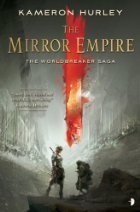
If you watch a lot of crime shows you’ll be familiar with the concept of “the murder board” – the white board or bulletin board where the detectives put up photos of the victims and suspects in a case, work out timelines for events, post photos of crime scenes or other key locations, and then draw lines between people and places and people and other people to indicate connections.
This kind of visual plotting device can be very handy for writers working with complex plots, too, especially in epic fantasy. On the timeline of events, which characters are where? Who’s going to be doing what by the midpoint of the book? Where are each of the main characters when this event takes place? How are these characters related to one another?
Plotting out The Mirror Empire’s sequel was less far less involved than any kind of detective-show murder board; I surely didn’t bother pasting and taping images and news clippings and the like all over my office and linking them together with string like a crime-show killer, either. I relied on my white board to figure out how many character POV’s I really had… and exactly what their arcs looked like for them personally and how those personal arcs intersected with some of the overarching plot points of the book.
My overarching plots points had to do with key battles and heavenly events – the magic system in The Mirror Empire’s world relies on magic users drawing on the power of particular satellites or heavenly bodies in the sky. When one satellite is up, those who can draw on the individual power of that body gain their powers. As it wanes in the sky, so do their powers. And as new bodies come up in the sky, folks with the ability to draw on that satellite come into their power. So you have this constant power shift happening through the whole series.
Now, the interesting part of this heavenly phenomenon is that, because this is a fantasy book, I wanted the orbits (or, more accurately, appearances) of these heavenly bodies to happen on erratic schedules. One could say, “Well, Sina only returns to the sky… oh, about every 10 to 12 years.” That means that there’s no exact, reliable date for when particular stars will become ascendant. That gave these societies less time to prepare for power shifts. Sometimes they simply happened – one star would be up, and you think it has two years left of ascendance, and then another one comes up and that one goes down the next day. It’s not an exact science. We’re dealing with some unknowable stuff here.
So I plotted out the book using three major events around which all the other character arcs needed to move. I wrote these all at the top of the board: The first was a key battle, which should happen about the 200 page mark. The second, a heavenly event, which should happen about the midpoint of the book. The third was the big endgame move, which would make up the climax of the final third of the novel. Then I went and wrote down all twelve (yes, twelve!) POV characters, some of which will only have three chapters or two chapters, and put those running down the far left corner of the board. After that, I started filling in what was happening with each of those characters during these major plot points of the book (and indicating who dies when – I’m not GRRM, but I do engage in tactical character death on occasion). These events should have to do with their character arcs while still moving the broader plot arc forward.
It’s no secret that plotting is the skill I must work hardest on. Worldbuilding and, to some extent, character, come much more easily to me. I didn’t have to work as hard, or, at least, it didn’t feel like as much work because I enjoyed it so much. Plot is a different matter.
With a book as complicated as the second in an epic fantasy series, with a dozen (!) point of view characters and a lot of epic, worldcrushing events that need to happen in just 160,000 words, I found that sitting down and just mapping out exactly what needed to happen to whom helped me clarify my intentions, and made the entirety of the book itself seem far more manageable and less overwhelming.
Now I’m engaged in the process of going through what I’ve written of the book so far and indicating which scenes are missing between each major event for each character. Outlining those missing scenes will help me write them faster once I’m done with the promotion period for The Mirror Empire. When you need a draft of a book on a book a year schedule, and have day job work, freelancing work, and book promotion on your plate, you have to find out a lot of hacks to help you write faster.
One of the things I’ve learned about the writing game is that everyone has a different process. What works for some writers – ruthless outlines and endless preparation – doesn’t work so much for me because I like to have a more organic writing experience. If I figure something out in the text, I want to be able to explore that more. But being on deadline means I need to figure out was to dink around less and write faster.
So this compromise – a rough outline that gives me the major plot points of the book, and tells me about where every character arc should be in relation to those events as the story progresses, is great for me. That still leaves me a lot of wiggle room for cool worldbuilding details I come up with or interesting plot twists that don’t affect the timeline of the overall plot arc.
Stories are living, breathing things to me; they are an act of brute creation. Figuring out how that act of creation works best for you as a writer is a powerful skill, and a huge part of the leveling up process.
---------
Many thanks to Kameron for this interesting post!
[image error]
Kameron has dropped in to talk about Murder Boards - over to Kameron
My Murder Board, Let Me Show You It: Plotting an Epic FantasySo, it’s true: I’m plotting the sequel to my epic fantasy novel The Mirror Empire using a murder board.

If you watch a lot of crime shows you’ll be familiar with the concept of “the murder board” – the white board or bulletin board where the detectives put up photos of the victims and suspects in a case, work out timelines for events, post photos of crime scenes or other key locations, and then draw lines between people and places and people and other people to indicate connections.
This kind of visual plotting device can be very handy for writers working with complex plots, too, especially in epic fantasy. On the timeline of events, which characters are where? Who’s going to be doing what by the midpoint of the book? Where are each of the main characters when this event takes place? How are these characters related to one another?
Plotting out The Mirror Empire’s sequel was less far less involved than any kind of detective-show murder board; I surely didn’t bother pasting and taping images and news clippings and the like all over my office and linking them together with string like a crime-show killer, either. I relied on my white board to figure out how many character POV’s I really had… and exactly what their arcs looked like for them personally and how those personal arcs intersected with some of the overarching plot points of the book.
My overarching plots points had to do with key battles and heavenly events – the magic system in The Mirror Empire’s world relies on magic users drawing on the power of particular satellites or heavenly bodies in the sky. When one satellite is up, those who can draw on the individual power of that body gain their powers. As it wanes in the sky, so do their powers. And as new bodies come up in the sky, folks with the ability to draw on that satellite come into their power. So you have this constant power shift happening through the whole series.
Now, the interesting part of this heavenly phenomenon is that, because this is a fantasy book, I wanted the orbits (or, more accurately, appearances) of these heavenly bodies to happen on erratic schedules. One could say, “Well, Sina only returns to the sky… oh, about every 10 to 12 years.” That means that there’s no exact, reliable date for when particular stars will become ascendant. That gave these societies less time to prepare for power shifts. Sometimes they simply happened – one star would be up, and you think it has two years left of ascendance, and then another one comes up and that one goes down the next day. It’s not an exact science. We’re dealing with some unknowable stuff here.
So I plotted out the book using three major events around which all the other character arcs needed to move. I wrote these all at the top of the board: The first was a key battle, which should happen about the 200 page mark. The second, a heavenly event, which should happen about the midpoint of the book. The third was the big endgame move, which would make up the climax of the final third of the novel. Then I went and wrote down all twelve (yes, twelve!) POV characters, some of which will only have three chapters or two chapters, and put those running down the far left corner of the board. After that, I started filling in what was happening with each of those characters during these major plot points of the book (and indicating who dies when – I’m not GRRM, but I do engage in tactical character death on occasion). These events should have to do with their character arcs while still moving the broader plot arc forward.
It’s no secret that plotting is the skill I must work hardest on. Worldbuilding and, to some extent, character, come much more easily to me. I didn’t have to work as hard, or, at least, it didn’t feel like as much work because I enjoyed it so much. Plot is a different matter.
With a book as complicated as the second in an epic fantasy series, with a dozen (!) point of view characters and a lot of epic, worldcrushing events that need to happen in just 160,000 words, I found that sitting down and just mapping out exactly what needed to happen to whom helped me clarify my intentions, and made the entirety of the book itself seem far more manageable and less overwhelming.
Now I’m engaged in the process of going through what I’ve written of the book so far and indicating which scenes are missing between each major event for each character. Outlining those missing scenes will help me write them faster once I’m done with the promotion period for The Mirror Empire. When you need a draft of a book on a book a year schedule, and have day job work, freelancing work, and book promotion on your plate, you have to find out a lot of hacks to help you write faster.
One of the things I’ve learned about the writing game is that everyone has a different process. What works for some writers – ruthless outlines and endless preparation – doesn’t work so much for me because I like to have a more organic writing experience. If I figure something out in the text, I want to be able to explore that more. But being on deadline means I need to figure out was to dink around less and write faster.
So this compromise – a rough outline that gives me the major plot points of the book, and tells me about where every character arc should be in relation to those events as the story progresses, is great for me. That still leaves me a lot of wiggle room for cool worldbuilding details I come up with or interesting plot twists that don’t affect the timeline of the overall plot arc.
Stories are living, breathing things to me; they are an act of brute creation. Figuring out how that act of creation works best for you as a writer is a powerful skill, and a huge part of the leveling up process.
---------
Many thanks to Kameron for this interesting post!
Published on September 09, 2014 01:08
Pete Sutton's Blog
- Pete Sutton's profile
- 14 followers
Pete Sutton isn't a Goodreads Author
(yet),
but they
do have a blog,
so here are some recent posts imported from
their feed.



